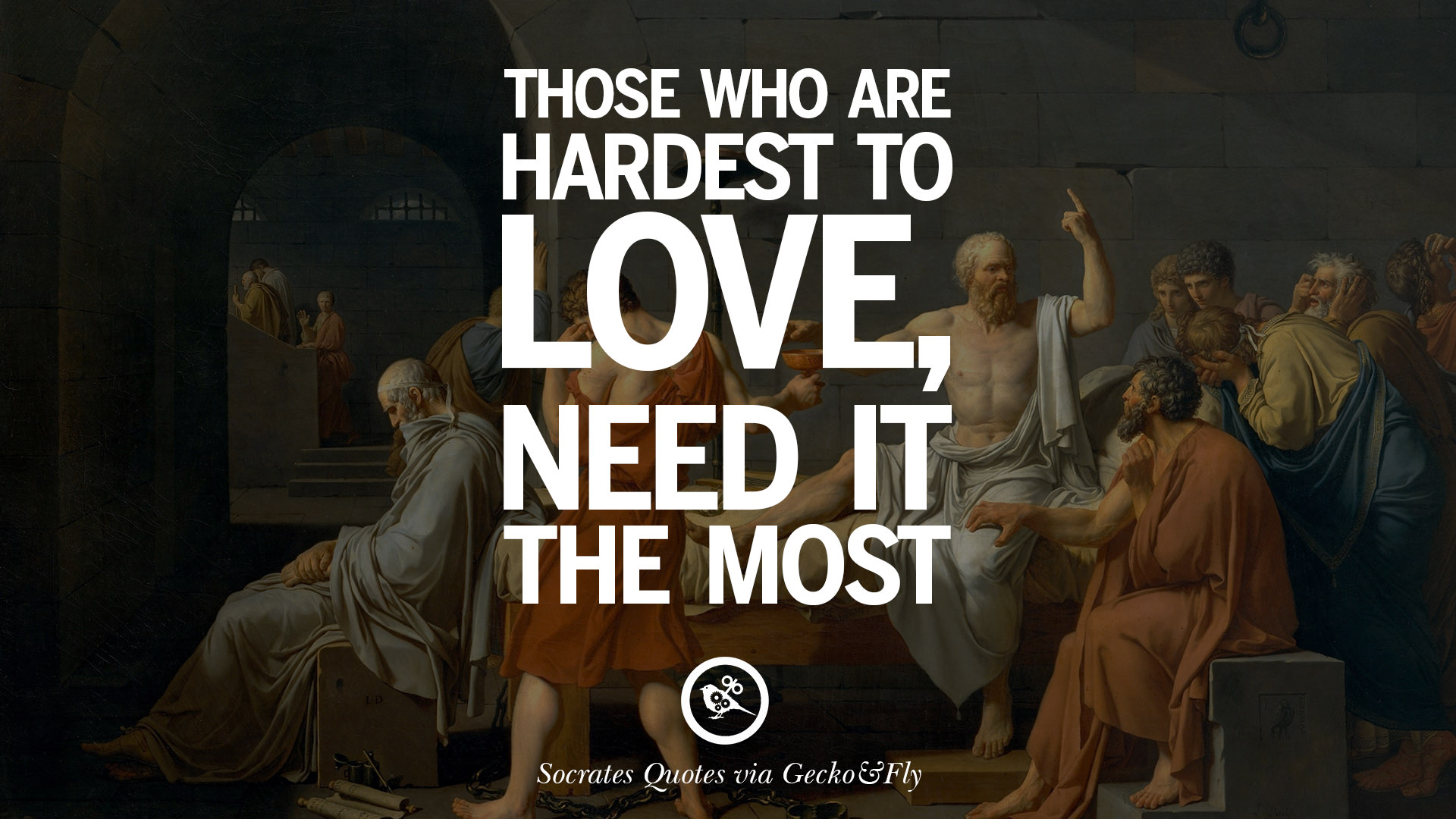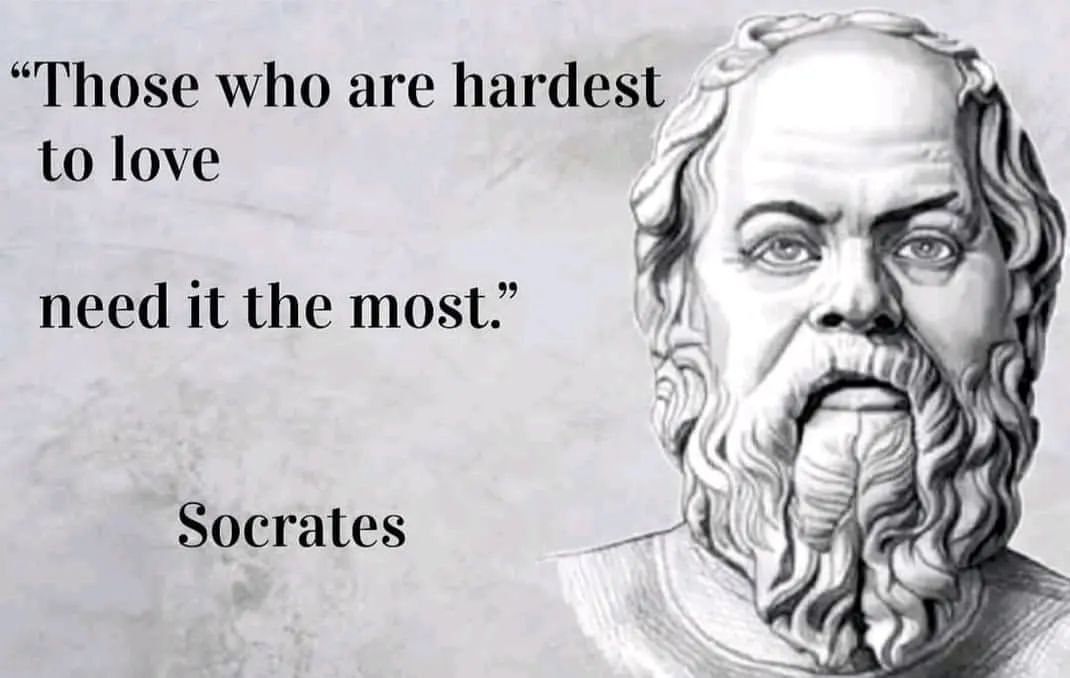Socrates Quotes On Love: Unveiling Timeless Wisdom For Deeper Connections
Have you ever stopped to think about what love truly means? It's a question people have pondered for centuries, and it's almost a universal human experience. In a way, understanding love can feel like trying to catch smoke, yet it's something we all yearn for and try to build in our lives. Many turn to ancient thinkers for guidance, and among them, Socrates stands out. While Socrates himself did not write any books, his profound ideas about life, virtue, and wisdom, which certainly touch on the nature of love, come to us primarily through the writings of his student, Plato. His approach to an examined life, as he taught, offers a powerful lens through which we can explore the very essence of our affections and bonds with others, even today in 2024.
Socrates, a pivotal figure in Western philosophy, believed that an unexamined life is not worth living. This idea, so famously put forth in Plato's Apology (36a), suggests that we should always look closely at the real reasons, or motivations, behind our human actions and beliefs. This kind of deep self-reflection, arguably, extends to how we love and who we love. So, even though we don't have a neat collection of "Socrates quotes on love" in the way we might for other topics, his entire philosophical framework provides a rich ground for thinking about love in a more thoughtful, deliberate way.
His teachings, passed down through Plato and later influencing Aristotle, still remain very popular today, and that's really saying something. They encourage critical thinking and a search for truth, which are, you know, quite helpful when trying to figure out something as complex and personal as love. We'll explore how Socrates' unique way of questioning and his core beliefs can illuminate our understanding of love, helping us to build more meaningful and authentic connections in our lives. It's a bit like taking a philosophical journey to better understand your heart.
Table of Contents
- Socrates: A Brief Look at the Man
- Socrates: Personal Details
- The Socratic Method and the Search for Truth in Love
- The Examined Life and Authentic Love
- Virtue, Knowledge, and the Nature of Love
- Simplicity, Moderation, and Loving Well
- The Triple Filter Test for Better Communication in Relationships
- FAQ: Socrates and Love
- Socrates' Legacy on Love and Living
Socrates: A Brief Look at the Man
Socrates, born in 469 BC, was a truly remarkable figure who lived during a time when Athens was trying out democracy. He wasn't like other teachers of his era; he didn't charge money for his lessons and, as a matter of fact, he never wrote anything down himself. He really believed that written speech, which was a revolution at that time, could make people forget how to think deeply for themselves. This is why his teachings were passed down orally and later recorded by others, especially Plato.
He spent most of his days in the marketplace, engaging citizens in conversations, asking them tricky questions about justice, virtue, and knowledge. He was always trying to get people to think critically about their own beliefs and what they thought they knew. This constant questioning, you know, was a big part of his method. He taught Plato, who then taught Aristotle, creating a very powerful line of philosophical thought that still influences us today. His philosophical theories and ways of questioning still remain popular today, which is quite impressive for someone who lived so long ago.
Socrates lived a simple life, eating a diet that typically included bread, olives, cheese, and maybe some vegetables. He truly believed in simplicity and moderation in all aspects of life. His life ended tragically in 399 BC, when he was executed in Athens at the age of 70, after being found guilty of impiety and corrupting the youth. He was forced to drink poison hemlock. Even facing death, he turned down the pleas of Crito, his friend, to try and escape from prison, staying true to his principles until the very end. His three sons were still young when he died, with the youngest being around seven or eight years old. It's really quite a profound story.
Socrates: Personal Details
| Detail | Information |
|---|---|
| Born | 469 BC |
| Died | 399 BC (Age 70) |
| Place of Death | Athens, Greece |
| Known For | Father of Western Philosophy, Socratic Method, Examined Life |
| Primary Student | Plato (born 428 BC, would have been 29/30 when Socrates died) |
| Student's Student | Aristotle |
| Written Works | None (believed writing hindered deep thought) |
| Diet | Simple (bread, olives, cheese, vegetables) |
| Family | Three sons (youngest around 7-8 when he died) |
| Cause of Death | Forced to drink hemlock (execution for impiety and corrupting youth) |
The Socratic Method and the Search for Truth in Love
The Socratic Method is basically a way of questioning that aims to get to the bottom of things. It involves asking a series of questions to help someone discover their own inconsistencies or to arrive at a deeper truth. When we think about Socrates quotes on love, or rather, his philosophical approach to love, this method becomes very relevant. Instead of just accepting what society or our feelings tell us about love, Socrates would encourage us to question it. What do we really mean when we say "I love you"? Is it true affection, or something else entirely? Is that a deep, lasting connection?
For instance, if someone said they loved another person, Socrates might ask: "What is love?" "What qualities in this person do you truly admire?" "Are you loving them for who they are, or for what they provide you?" These kinds of questions, you know, push us beyond surface-level emotions to examine the underlying values and motivations. It's about seeking genuine understanding, which is quite important for any real connection. This rigorous self-inquiry can help us to build relationships that are based on truth and clear-eyed understanding, rather than just fleeting feelings or expectations.
This process of questioning can be a bit uncomfortable, but it's meant to lead to greater wisdom. It helps us to see if our idea of love is truly virtuous and beneficial, not just for ourselves, but for the other person too. So, in some respects, his method encourages us to apply the same critical thinking to our romantic and personal relationships that he applied to concepts like justice or piety. It's about really looking at the reasons, or motivations, behind our human interactions, as he spent most of his days examining. It really is a powerful tool for self-discovery within the context of relationships.
The Examined Life and Authentic Love
Socrates' most famous declaration, "an unexamined life is not worth living," has profound implications for how we approach love. To live an examined life means to constantly reflect on our values, beliefs, and actions. When it comes to love, this means not simply falling into relationships or loving without thinking about why or how we are doing it. It suggests that true love, a deep and meaningful connection, requires introspection and self-awareness. You know, it's about understanding ourselves first before we can truly understand and love another.
This idea encourages us to ask ourselves tough questions about our romantic choices and our behavior within relationships. Are we loving genuinely, or are we seeking something to fill a void? Are our actions in love consistent with our deepest values? This kind of self-scrutiny can lead to a more authentic way of loving. It means moving beyond superficial attractions to seek a connection based on shared values and mutual growth. It's a bit like polishing a mirror so you can see your own reflection clearly, and then, you know, see the reflection of another person more truly as well.
An examined approach to love also means being honest with ourselves about our own flaws and areas for improvement. Socrates believed that understanding oneself was the first step to wisdom. If we are self-aware, we can bring a more complete and honest version of ourselves to our relationships. This, in turn, allows for a deeper, more resilient kind of love to flourish. It's not about perfection, but about continuous effort and a willingness to learn and grow together. That, really, is a core part of what makes a connection strong.
Virtue, Knowledge, and the Nature of Love
Socrates often connected virtue with knowledge, believing that wrongdoing stemmed from ignorance. If someone truly knew what was good, they would always choose to do good. How does this relate to Socrates quotes on love, or his general perspective on love? Well, it suggests that a truly good and virtuous love would be based on knowledge—knowledge of oneself, knowledge of the other person, and knowledge of what constitutes a truly good relationship. It’s not just about feelings, but about understanding and acting rightly.
For Socrates, the highest form of love would arguably be a love that seeks the good, the beautiful, and the true. This isn't just about physical attraction, but about appreciating the inner qualities and virtues of another person. It's about loving someone for their character, their wisdom, and their goodness. This kind of love, you know, would encourage both individuals to become better versions of themselves. It's a love that uplifts and inspires, rather than just satisfies immediate desires. It's a very elevated way of looking at connection.
Moreover, if virtue is knowledge, then cultivating a loving relationship involves continuously learning and growing. It means seeking to understand your partner's perspective, their needs, and their aspirations. It also means striving to embody virtues like honesty, patience, and kindness within the relationship. This pursuit of knowledge and virtue in love makes the bond stronger and more resilient, apparently. It’s a dynamic process, not a static state. So, love, in this view, becomes a path to personal and shared excellence, which is a pretty powerful idea.
Simplicity, Moderation, and Loving Well
From what I've been taught, Socrates lived a very simple life, eating basic foods like bread, olives, and cheese. He truly believed in simplicity and moderation in all aspects of life. This philosophy extends beyond diet and possessions; it can also be applied to how we approach love and relationships. In a world that often encourages excess and grand gestures, Socrates' emphasis on moderation offers a calming counterpoint. What does it mean to love simply and moderately?
It could mean focusing on the core elements of a relationship rather than getting caught up in superficial displays or unrealistic expectations. It's about appreciating the quiet moments, the genuine connection, and the shared experiences that truly matter, rather than chasing constant excitement or material validation. This kind of love is perhaps less about dramatic declarations and more about consistent, heartfelt actions. It's a bit like nurturing a garden; you tend to it regularly, with care, rather than expecting it to bloom magically overnight.
Moderation in love also implies balance. It means not allowing love to consume you entirely, or to neglect other important aspects of your life, like personal growth or friendships. It's about finding a healthy equilibrium where love enriches your life without becoming an obsession. This balanced approach, you know, fosters a more sustainable and peaceful relationship. It allows both individuals to maintain their individuality while still being deeply connected. It's a very practical way to think about long-term happiness in relationships, really.
The Triple Filter Test for Better Communication in Relationships
Socrates' three filters, also known as the triple filter test, are significant in determining the validity of information and beliefs because they encourage critical thinking. While not explicitly about love, this test is incredibly useful for communication within relationships. The story goes that someone came to Socrates wanting to share gossip, and he asked them to pass it through three filters: truth, goodness, and usefulness. This framework, you know, can dramatically improve how we talk to our loved ones and what we choose to share.
The first filter is **Truth**. Before you say something to your partner, ask yourself: Is what I'm about to say absolutely true? Is it based on facts, or is it just an assumption or a rumor? Misunderstandings often arise from sharing unverified information. Applying this filter can prevent unnecessary arguments and build a foundation of honesty and trust in the relationship. It's a very simple, yet powerful, starting point for any conversation.
The second filter is **Goodness**. Is what I'm about to say good or kind? Will it uplift or hurt the other person? Even if something is true, it might not be kind or beneficial to share, especially if it's meant to cause pain or resentment. This filter encourages empathy and compassion in our communication, helping us to speak with love and consideration. It's about choosing words that build up, rather than tear down, which is really important for a healthy bond.
The third filter is **Usefulness**. Is what I'm about to say useful or necessary? Will it contribute positively to the conversation or the relationship? Sometimes, even true and kind words might not be useful in a given moment. This filter helps us to be mindful of timing and relevance, ensuring that our communication serves a constructive purpose. Using these filters, you know, can transform how couples interact, leading to clearer, more respectful, and more loving conversations. It's a pretty straightforward way to foster better understanding.
FAQ: Socrates and Love
Here are some common questions people ask about Socrates and his ideas, particularly as they might relate to love.
What did Socrates say about true love?
While Socrates did not leave us direct quotes specifically defining "true love," his philosophy strongly suggests that genuine love would be rooted in virtue, knowledge, and the pursuit of goodness. He believed that understanding oneself and striving for wisdom were essential. Therefore, true love, from a Socratic perspective, would involve appreciating the inner character and virtues of another person, rather than just superficial qualities. It's about a shared journey toward becoming better individuals, which is a pretty deep idea.
How did Socrates influence Plato's view on love?
Socrates had a significant influence on Plato's philosophy, which in turn shaped Aristotle's views and teachings. Plato's famous dialogue, the Symposium, explores different facets of love, often with Socrates as a central figure discussing the ascent from physical attraction to the love of beauty itself, and ultimately to the love of wisdom and the Good. So, in a way, Socrates' emphasis on seeking truth and virtue laid the groundwork for Plato's more elaborate theories on love as a desire for what is eternal and perfect. It's like Plato took Socrates' seeds of thought and grew a whole garden of ideas.
What is the Socratic method for relationships?
The Socratic method, applied to relationships, involves asking open-ended, probing questions to foster deeper understanding and critical self-reflection. Instead of making assumptions or reacting emotionally, you would ask questions to clarify beliefs, explore motivations, and uncover underlying truths. For instance, if there's a disagreement, you might ask, "What exactly do you mean by that?" or "What makes you feel that way?" This approach encourages both partners to examine their own thoughts and feelings, leading to more meaningful communication and problem-solving. It's a bit like being a gentle detective in your own relationship, trying to uncover all the facts.
Socrates' Legacy on Love and Living
Socrates, though he left no written words of his own, has given us an incredibly rich framework for living a thoughtful and purposeful life. His emphasis on the examined life, the pursuit of virtue, and the power of critical questioning, even in 2024, offers timeless insights that are profoundly relevant to our understanding of love and relationships. He taught us that true wisdom comes from knowing ourselves and constantly striving for goodness, and that applies very much to how we connect with others. His philosophical theories and ways of questioning still remain popular today, which is quite a testament to their enduring value.
When we look for "Socrates quotes on love," what we really find is a philosophy that encourages us to approach love with introspection, honesty, and a commitment to growth. It's about loving with our minds as much as with our hearts, seeking genuine connection that is built on truth and shared values. This isn't about finding perfect love, but about continually working to make our love more virtuous, more knowledgeable, and more authentic. It's a challenging path, but one that promises deeper, more meaningful bonds. You can learn more about ancient philosophy on our site, and perhaps explore more about how these ideas influenced thinkers like Plato and Aristotle.
Aesculapius was the god of healing and wellness. Socrates is telling his friend that a rooster needs to be sacrificed to Aesculapius. This final act, as he was about to die, showed his deep respect for tradition and his belief in a debt owed, even in his last moments. It speaks to a life lived with conviction, a life that, in its very essence, sought truth and understanding in all things, including the profound connections we call love. His influence on Plato, who in turn shaped Aristotle's views, is a clear line of philosophical thought that continues to resonate.

Socrates Quotes on Love, Youth and Philosophy

18 Quotes By Socrates On The Purpose And Wisdom Of Life

"Those who are hardest to love need it the most." Socrates. - Phrases